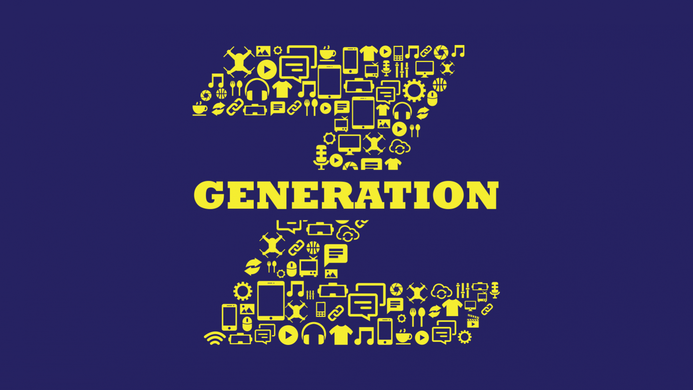For years, ‘millennials’ has been used as a vague shorthand for young people and, by extension, students. It’s become such a familiar term that most people – the media being a prime culprit – have largely missed the fact that the oldest millennials are pushing 40 (sob).
But the vast majority of the students on our campus are part of Generation Z. How much do we really know about them?
Obviously, most of us will know individual members of this generation – but what do we know about the collective whole?
I went along to WonkHE’s The Secret Life of Students event to find out. This is what I now know.

Who are they?
Generation Z includes everyone born between 1995 and 2010 – that’s as young as nine and as old as 24.
Those in the know call them Little Zs (born 2003-2010) and Big Zs (born 1995-2002).
It will take until 2032 for most of them to graduate, so they are going to be a big part of campus life for a while yet.
On technology
They have never lived in a world without the internet (no wi-fi jokes please).
Nearly half of their spare time is spent online. Two-thirds report multi-tasking across multiple devices. 38 per cent of UK 15 year olds use the internet more than six hours a day. This the most in the OECD. 17 per cent of this time is on gaming, a massive growth compared to millennials.
88 per cent have access to a computer; 78 per cent have a smartphone (this figure is higher if you discount those not yet old enough for a phone). By 2020, there will be 35.6 million tablet users among Gen Z.
They watch two hours of ‘traditional’ scheduled TV a week but 70 per cent watch more than three hours of mobile video.
They are the largest wearers of wearable tech.
They dislike email and speaking on the phone.
There is no evidence that their attention span is shorter.
Excessive technology use is making them less satisfied with life than previous generations.
On money
Because of financial crises and budget cuts, they are more financially conservative than previous generations.
Unlike millennials, they do not feel resentful of previous generations for their financial outlook.
They have grown up with the gig economy and see their ideas, not their labour, as currency.
On society and politics
Because of the immediate nature of news and social media, they feel more exposed to disaster, tragedy and threats to personal safety than previous generations.
They are having more conversations about identity and they care about equity and equality. 77 per cent support same-sex marriage, 80 per cent support trans rights, 90 per cent view men and women as equal. The vast majority (89 per cent) believe gay people should be able to live together, up from 40 per cent in 1975.
They will follow people, organisations and brands who advocate for something they believe in. They want something to light their hearts on fire.
Volunteering and social action is up among this generation.
They are more ethical in their purchasing behaviour.
58 per cent believe that making a contribution to society is important, but they don’t always know how they can get involved.
They are more likely than millennials to protest.
They are voting in higher numbers than previous generations were at the same age.
They are less likely to stick with one political party, looking at policies instead.
On people and relationships
They are massively influenced by people they trust. 69 per cent say their parents are their top role model. 89 per cent report their parents impacting their values. They are also swayed by friends and peers (78 per cent) and teachers (70 per cent).
They are much less influenced by celebrities than people think, with celebs and politicians ranking lower even than fictional characters in the trust stakes.
They highly value face-to-face contact and communication. This doesn’t have to be in person; video works almost as well. But they do want to see faces.
Over 70 per cent choose similar characteristics to describe themselves: loyal, responsible, open-minded, determined and compassionate.
They are motivated by relationships, passions and achievements.
They are a very ‘we-centric’ generation. Three-quarters of their biggest concerns are beyond themselves, ie those affecting everyone or others.
They trust ‘real’ people more than authority figures, looking at reviews and forums before making decisions.
On health
They are more mild than wild. They are less sexually active, smoke less marijuana and are much less likely to be a criminal – the number of detained young people is down a massive 48 per cent across Europe. Just 36 per cent of 13-15 year olds have tried alcohol, down from 76 per cent of millennials.
Paradoxically, they are much less aware of the risks of all of these things.
94% believe physical and mental health is important to happiness.
But they score less well for wellbeing than previous generations, with only 31 per cent reporting good emotional wellbeing.
The biggest things weighing on their hearts are: financial security and money, employment and the cost of higher education, inclusion and equality issues, the environment and personal safety.
On university (of those who have been)
Well, only 10 per cent of students say their experience of university matches their expectations. Two-thirds thought they would have more contact hours, while less than half realised rent would be their biggest cost.
A third had formed opinions about universities before sixth form.
77 per cent said that reviews had influenced where they decided to go to university.
They only pick up the prospectus for their parents. BUT a quarter said their parents were the biggest influence over their choice of university.
Their biggest fears about university are ‘stepping up’ from school and worries about workload.
They want more help transitioning to university life. They see themselves as independent but not adults.
They want a realistic, ‘warts and all’ view of university before they come.
They like hands-on learning and prefer to watch a video of the lecture/lesson beforehand and then spend lesson time engaged in experiential learning.
They value most what they can see in front of them, eg teaching and facilities. They care less about their lives after graduation, eg careers.
Their main gripes at university are around course content, the quality of contact with teachers and not knowing where their fees go.
Wi-fi, transport and environmental concerns are also of real importance. There is clearly real value in getting the basics right.
But, according to an analysis of 20,000 forums and six million tweets, the absolute number one thing that universities can do to improve satisfaction? Give students free hot water in cafes. Apparently, they really resent having to pay for this if they’ve brought their own mug. (I’m already calling it the Students’ Thirst strategy.)
Next gen
Ok so all up to speed with Gen Z? Great – get ready for Generation α [Alpha]. Basically, anybody born since 2010. Or, as one commenter put it, “You know: toddlers, babies, the unborn.”
In 2028, they will be old enough to go to university. Expect the follow up to this blog post in nine years’ time.


“They want a realistic, ‘warts and all’ view of university before they come”
So would I as a potential student in 2019. Interested to know how we could give them that.
Thanks for writing this, James. Good to get an overview of what was discussed at the conference.
My only questions from this would be: How many people were surveyed to get this data?
And, where are they from? Would the data look different if the students surveyed were from a key recruitment region like, say, Saudi Arabia?
Hi Adrian and thanks for your comment. The blog draws on a presentation by Meghan Grace, author of Generation Z Goes To College. Her book looks at a number of studies, amounting to around 150,000 people, and is focused on the US. There is also info from a great piece of work done by Ipsos Mori here in the UK. You can read that report online. I also included other interesting info I heard throughout the day.
In answer to your final question, inevitably yes. The blog is necessarily very general and also doesn’t address the specific needs and characteristics of mature, disabled, LGBT, BAME, part-time students etc. We shouldn’t fall into the trap of forgetting the diversity of our student body. But I think it does give a big picture insight into a generation to which the majority of our students belong.